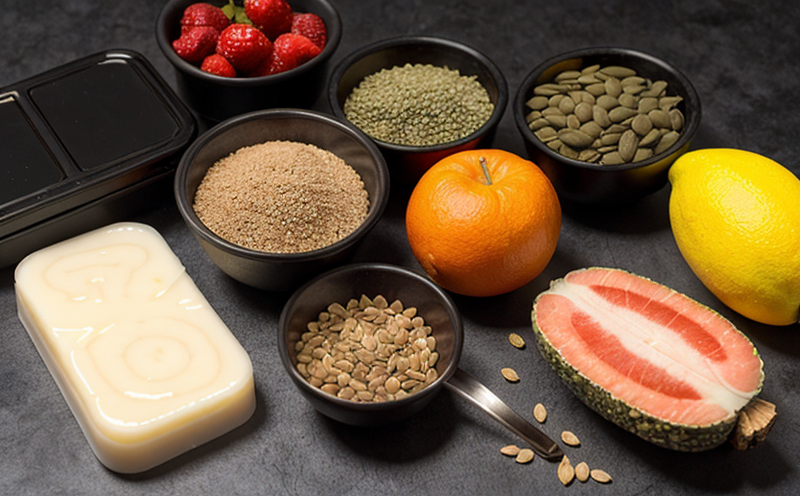EN 15914 Determination of Gross Energy in Animal Feed
The European Standard EN 15914 provides a method for determining gross energy (GE) content in animal feed materials. This test is crucial for ensuring the nutritional quality and consistency of feeds, which directly impacts animal health and performance.
Gross energy refers to the total heat released when a substance undergoes combustion. In animal feeds, it represents the overall calorific value available to animals. Accurate determination ensures that feed manufacturers can provide products tailored to specific dietary requirements, thereby supporting optimal growth, reproduction, and productivity in livestock.
EN 15914 specifies a bomb calorimeter as the primary apparatus for this test. A bomb calorimeter is designed to measure the heat released when a sample burns completely under controlled conditions. The procedure involves several steps:
- Sampling and preparation of the feed material.
- Weighing an appropriate amount of the sample into a combustion crucible.
- Inserting the crucible into the bomb calorimeter, ensuring it is tightly sealed to prevent air from entering during combustion.
- Adding an excess of oxygen and igniting the feed material inside the bomb.
- Measuring the temperature rise of the water surrounding the bomb after combustion.
The accuracy of this method depends on precise sample preparation, calibration of the calorimeter, and consistent experimental conditions. The standard also outlines acceptance criteria based on repeatability and reproducibility. Repeatability is typically within ±2% for laboratories with a good quality management system.
Understanding the gross energy content helps in formulating feeds that meet specific nutritional needs. This includes balancing macronutrients like proteins, fats, and carbohydrates to ensure they support growth without causing obesity or deficiencies. For instance, diets high in fat may be suitable for certain types of livestock but could lead to health issues if not balanced correctly.
| Step | Description | Value (MJ/kg) |
|---|---|---|
| Weighing sample | 0.5 g of feed material | 12.3 MJ/kg |
| Bomb calorimeter temperature rise | 21°C post-combustion |
EuroLab offers comprehensive support for EN 15914 compliance with a suite of advanced services:
- State-of-the-art equipment including high-precision bomb calorimeters.
- Trained and certified technicians who adhere strictly to ISO/IEC 17025 standards for accuracy and reliability.
- Comprehensive data analysis and reporting tailored to your specific requirements.
- Access to technical support from our experienced experts across various sectors including food, pharmaceuticals, and environmental testing.
We ensure that all tests comply with international standards such as EN 15914. Our services are designed to meet the needs of quality managers, compliance officers, R&D engineers, and procurement teams alike. By choosing EuroLab for your EN 15914 testing, you can rest assured that your products will meet stringent regulatory requirements and exceed customer expectations.
Quality and Reliability Assurance
EuroLab is committed to maintaining the highest standards of quality and reliability in all our services. Our laboratories are equipped with cutting-edge technology, including calibrated bomb calorimeters that comply with EN 15914 requirements.
We follow strict protocols for sample preparation and handling, ensuring consistency across tests. Our technicians undergo continuous training to stay abreast of the latest developments in analytical chemistry. This rigorous approach guarantees accurate results every time, enhancing trust and credibility among our clients.
Our commitment extends beyond just meeting regulatory standards; we strive to exceed expectations by providing timely delivery, clear communication, and personalized service. We understand that reliable data is crucial for decision-making processes within your organization. Therefore, we invest heavily in maintaining top-notch facilities and personnel.
Use Cases and Application Examples
- Dietary Assessment: Accurate gross energy determination allows for precise dietary assessment, ensuring that feeds meet the exact nutritional requirements of different animal species.
- Packaging Claims Validation: Ensuring that product labels accurately reflect the energy content as stated on packaging is essential. This helps maintain consumer trust and complies with labeling regulations.
- New Product Development: By using EN 15914 methods, developers can tailor feeds to meet emerging market trends or specific animal health needs.
- Supply Chain Management: Regular testing ensures that suppliers consistently deliver products meeting the specified energy content levels, supporting seamless supply chains and reducing risks associated with variability in feed quality.





